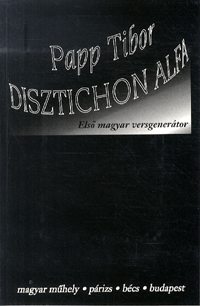
It was sorrowful to learn that Tibor Papp (1936-2018), Hungarian poet living in Paris, had died. Papp was a prominent Hungarian avant-garde artist and a pioneer in computer use in literary work. He created Disztichon Alfa, a poem-generator, which was one of the wittiest creations in combinatory poetry. It is a masterpiece, an eternal one.
His work was published and came with a floppy disk in the early 1990s by Magyar Műhely [Hungarian Atelier], an art journal edited by Papp and initially published in Paris. The floppy included the programme that could run on an Apple Macintosh. The programme, using an algorithm Tibor Papp had developed, drew on the database of words, also compiled by him, to create perfect Hungarian distiches (metrical poems consisting of a hexameter and a pentameter). Obviously, the book included only a selection of poems as printing them all is impossible.
Disztichon Alfa is perfectly reflective of Tibor Papp’s personality: it is brave, witty, provocative, sometimes even slightly pornographic, and genuinely crazy. His art is avant-garde yet classical at the same time: his poems are his work and not the computer’s; but it is the computer that added almost total infinity to his work. When we read these distiches on a screen, we may be reading something that no human eye will ever see again. And here comes the next one...
With typography and printing at his fingertips, Tibor Papp’s activities belong to the history of literature and computer science. Anyone interested in computer use in the process of creating literature will get an indispensible guide, when they read Papp’s work entitled Múzsával vagy múzsa nélkül? [With or Without a Muse].
After the political changes in Hungary, Tibor Papp lived in Paris and Budapest alternatively. His apartment in Buda was decorated with works by his friends, including Victor Vasarely, and by his own pieces: logo mandalas and uniquely beautiful map poems. He was an excellent host, thoughtful and sociable, while he smoked his cigarettes and talked about Alire, the very first digital journal, which he founded in 1989 and was editor of; or about visual poetry; or about Magyar Műhely, a hallmark of Hungarian avant-garde in Paris; or about programming the Sinclair ZX-81.
Tibor Papp was awarded the József Attila Prize, but unfortunately he did not receive the Kossuth Prize until his death. This might have been the Hungarian recognition (now only posthumous) of computer culture. We have lost an international pioneer in digital literature and a great old, committed avant-garde artist. The intellectual adventure and play Papp had engaged in should be appriciated and have a place in Hungarian culture. We should be proud of the Hungaricum in Parisian avant-garde.
We are priviledged to have known a man of such integrity, never abandoning his own values; a kind, committed, and interesting personality indeed. Rest in peace.
Képes Gábor
The Hungarian National Digital Archive, with contribution from Gábor Képes, produced a film that offers a portray of Tibor Papp. It can be viewed here:
http://mandadb.hu/tart/mcitem/626411
Disztichon Alfa at the Hungarian Electronic Library:
http://mek.oszk.hu/11700/11744/
Óraköltemények [Clock Poetry] at the Hungarian Electronic Library:
http://mek.oszk.hu/11900/11984/

